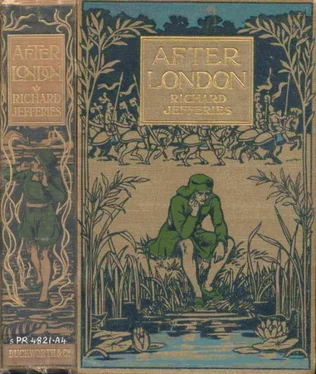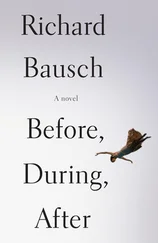Richard Jefferies - After London
Здесь есть возможность читать онлайн «Richard Jefferies - After London» весь текст электронной книги совершенно бесплатно (целиком полную версию без сокращений). В некоторых случаях можно слушать аудио, скачать через торрент в формате fb2 и присутствует краткое содержание. Город: London, Год выпуска: 1905, Издательство: Duckworth & Co., Жанр: sf_postapocalyptic, на английском языке. Описание произведения, (предисловие) а так же отзывы посетителей доступны на портале библиотеки ЛибКат.
- Название:After London
- Автор:
- Издательство:Duckworth & Co.
- Жанр:
- Год:1905
- Город:London
- ISBN:нет данных
- Рейтинг книги:4 / 5. Голосов: 1
-
Избранное:Добавить в избранное
- Отзывы:
-
Ваша оценка:
- 80
- 1
- 2
- 3
- 4
- 5
After London: краткое содержание, описание и аннотация
Предлагаем к чтению аннотацию, описание, краткое содержание или предисловие (зависит от того, что написал сам автор книги «After London»). Если вы не нашли необходимую информацию о книге — напишите в комментариях, мы постараемся отыскать её.
(1885), set in a future in which urban civilization has collapsed after an environmental crisis.” (From
).
This eBook is for the use of anyone anywhere at no cost and with almost no restrictions whatsoever. You may copy it, give it away or re-use it under the terms of the Project Gutenberg License included with this eBook or online at
* * *
After London — читать онлайн бесплатно полную книгу (весь текст) целиком
Ниже представлен текст книги, разбитый по страницам. Система сохранения места последней прочитанной страницы, позволяет с удобством читать онлайн бесплатно книгу «After London», без необходимости каждый раз заново искать на чём Вы остановились. Поставьте закладку, и сможете в любой момент перейти на страницу, на которой закончили чтение.
Интервал:
Закладка:
By now being some distance from any island, the wavelets increased in size, and spray flew on board, wetting everything with this black liquid. Instead of level marshes and the end of the gulf, it appeared as if the water were deep, and also as if it widened. Exposed to the full press of the gale, Felix began to fear that he should not be able to return very easily against it. He did not know what to do. The horrid blackness of the water disposed him to turn about and tack out; on the other hand, having set out on a voyage of discovery, and having now found something different to the other parts of the Lake, he did not like to retreat. He sailed on, thinking to presently pass these loathsome waters.
He was now hungry, and indeed thirsty, but was unable to drink because he had no water-barrel. No vessel sailing on the Lake ever carried a water-barrel, since such pure water was always under their bows. He was cramped, too, with long sitting in the canoe, and the sun was perceptibly sloping in the west. He determined to land and rest, and with this purpose steered to the right under the lee of a large island, so large, indeed, that he was not certain it was not part of the mainland or one side of the gulf. The water was very deep close up to the shore, but, to his annoyance, the strand appeared black, as if soaked with the dark water. He skirted along somewhat farther, and found a ledge of low rocks stretching out into the Lake, so that he was obliged to run ashore before coming to these.
On landing, the black strand, to his relief, was fairly firm, for he had dreaded sinking to the knees in it; but its appearance was so unpleasant that he could not bring himself to sit down. He walked on towards the ledge of rocks, thinking to find a pleasanter place there. They were stratified, and he stepped on them to climb up, when his foot went deep into the apparently hard rock. He kicked it, and his shoe penetrated it as if it had been soft sand. It was impossible to climb up the reef. The ground rose inland, and curious to see around him as far as possible, he ascended the slope.
From the summit, however, he could not see farther than on the shore, for the pale yellow mist rose up round him, and hid the canoe on the strand. The extreme desolation of the dark and barren ground repelled him; there was not a tree, bush, or living creature, not so much as a buzzing fly. He turned to go down, and then for the first time noticed that the disk of the sun was surrounded with a faint blue rim, apparently caused by the yellow vapour. So much were the rays shorn of their glare, that he could look at the sun without any distress, but its heat seemed to have increased, though it was now late in the afternoon.
Descending towards the canoe, he fancied the wind had veered considerably. He sat down in the boat, and took some food; it was without relish, as he had nothing to drink, and the great heat had tired him. Wearily, and without thinking, he pushed off the canoe; she slowly floated out, when, as he was about to hoist up the sail, a tremendous gust of wind struck him down on the thwarts, and nearly carried him overboard. He caught the mast as he fell, or over he must have gone into the black waves. Before he could recover himself, she drifted against the ledge of rocks, which broke down and sank before the bow, so that she passed over uninjured.
Felix got out a paddle, and directed the canoe as well as he could; the fury of the wind was irresistible, and he could only drive before it. In a few minutes, as he was swept along the shore, he was carried between it and another immense reef. Here, the waves being broken and less powerful, he contrived to get the heavy canoe ashore again, and, jumping out, dragged her up as far as he could on the land. When he had done this, he found to his surprise that the gale had ceased. The tremendous burst of wind had been succeeded by a perfect calm, and the waves had already lost their violent impetus.
This was a relief, for he had feared that the canoe would be utterly broken to pieces; but soon he began to doubt if it were an unmixed benefit, as without a wind he could not move from this dismal place that evening. He was too weary to paddle far. He sat on the canoe to rest himself, and, whether from fatigue or other causes, fell asleep. His head heavily dropping on his chest partly woke him several times, but his lassitude overcame the discomfort, and he slept on. When he got up he felt dazed and unrefreshed, as if sleeping had been hard work. He was extremely thirsty, and oppressed with the increasing heat. The sun had sunk, or rather was so low that the high ground hid it from sight.
CHAPTER XXIII
STRANGE THINGS
The thought struck Felix that perhaps he might find a spring somewhere in the island, and he started at once up over the hill. At the top he paused. The sun had not sunk, but had disappeared as a disk. In its place was a billow of blood, for so it looked, a vast up-heaved billow of glowing blood surging on the horizon. Over it flickered a tint of palest blue, like that seen in fire. The black waters reflected the glow, and the yellow vapour around was suffused with it. Though momentarily startled, Felix did not much heed these appearances; he was still dazed and heavy from his sleep.
He went on, looking for a spring, sometimes walking on firm ground, sometimes sinking to the ankle in a friable soil like black sand. The ground looked, indeed, as if it had been burnt, but there were no charred stumps of timber such as he had seen on the sites of forest fires. The extreme dreariness seemed to oppress his spirits, and he went on and on in a heavy waking dream. Descending into a plain, he lost sight of the flaming sunset and the black waters. In the level plain the desolation was yet more marked; there was not a grass-blade or plant; the surface was hard, black, and burned, resembling iron, and indeed in places it resounded to his feet, though he supposed that was the echo from hollow passages beneath.
Several times he shook himself, straightened himself up, and endeavoured to throw off the sense of drowsy weight which increased upon him. He could not do so; he walked with bent back, and crept, as it were, over the iron land which radiated heat. A shimmer like that of water appeared in front; he quickened his pace, but could not get to it, and realized presently that it was a mirage which receded as he advanced. There was no pleasant summer twilight; the sunset was succeeded by an indefinite gloom, and while this shadow hung overhead the yellow vapour around was faintly radiant. Felix suddenly stopped, having stepped, as he thought, on a skeleton.
Another glance, however, showed that it was merely the impression of one, the actual bones had long since disappeared. The ribs, the skull, and limbs were drawn on the black ground in white lines as if it had been done with a broad piece of chalk. Close by he found three or four more, intertangled and superimposed as if the unhappy beings had fallen partly across each other, and in that position had mouldered away leaving nothing but their outline. From among a variety of objects that were scattered about Felix picked up something that shone; it was a diamond bracelet of one large stone, and a small square of blue china tile with a curious heraldic animal drawn on it. Evidently these had belonged to one or other of the party who had perished.
Though startled at the first sight, it was curious that Felix felt so little horror; the idea did not occur to him that he was in danger as these had been. Inhaling the gaseous emanations from the soil and contained in the yellow vapour, he had become narcotized, and moved as if under the influence of opium, while wide awake, and capable of rational conduct. His senses were deadened, and did not carry the usual vivid impression to the mind; he saw things as if they were afar off. Accidentally looking back, he found that his footmarks, as far as he could see, shone with a phosphoric light like that of “touchwood” in the dark. Near at hand they did not shine; the appearance did not come till some few minutes had elapsed. His track was visible behind till the vapour hid it. As the evening drew on the vapour became more luminous, and somewhat resembled an aurora.
Читать дальшеИнтервал:
Закладка:
Похожие книги на «After London»
Представляем Вашему вниманию похожие книги на «After London» списком для выбора. Мы отобрали схожую по названию и смыслу литературу в надежде предоставить читателям больше вариантов отыскать новые, интересные, ещё непрочитанные произведения.
Обсуждение, отзывы о книге «After London» и просто собственные мнения читателей. Оставьте ваши комментарии, напишите, что Вы думаете о произведении, его смысле или главных героях. Укажите что конкретно понравилось, а что нет, и почему Вы так считаете.












